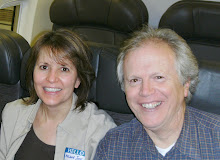From left to right: Brenna (ICU-UCSD), Cassia (ICU-UCSD), Melanie, Angela (ICU-UCSD), Melissa (CRNA-LLU) and Shelly (ICU-UCSD)
These four young women from Thornton Hospital at UCSD decided to come to Haiti and joined with a vounteer group to get transport to Haiti. The hospital has no ICU yet. They went straight to the OR and created order out of disorder. They organized the supplies and drugs both the new and old. They cleaned. They ran the board and the patient transport. It put me in mind of Stephen Ambroise writing about how World War II put very young people in positions of high responsibility. They rose to the occasion.
Not your usual picture of the night supervisor? Cassia is rounding in the post-op area. She will be wearing a hiker's head light for rounding in the dark. Surgeons wear them to operate when there is power failure.
Johnny DeBeers' team from South Africa. Backed by Gift of the Giver, a Muslim charity in South Africa, the team flew to Paris and from there to Punta Cana at the extreme East end of the Dominican Republic. They went by car and truck from there to Port-au-Prince, some 16 hours? This young group included: one Nurse, one PA, one Anesthesiologist, three Ortho. Surgeons, one vascular surgeon and one maxillofacial surgeon. These young caregivers looked fresh-as-a-daisy in spite of their journey and did great work.
Mimi an orthopaedic traumatologist and LLU alum found her way from San Luis Obispo with two other docs and gave yeoman service in the tent at the university.
Last but not least, these Pathfinders aided with security in the hospital and helped in the ADRA warehouse. ADRA was supplying the tent city at the university and helped out our hospital. (Pathfinders is an international youth organization; ADRA is the Adventist Develpment and Relief Agency, and NGO active all over the globe.)






















